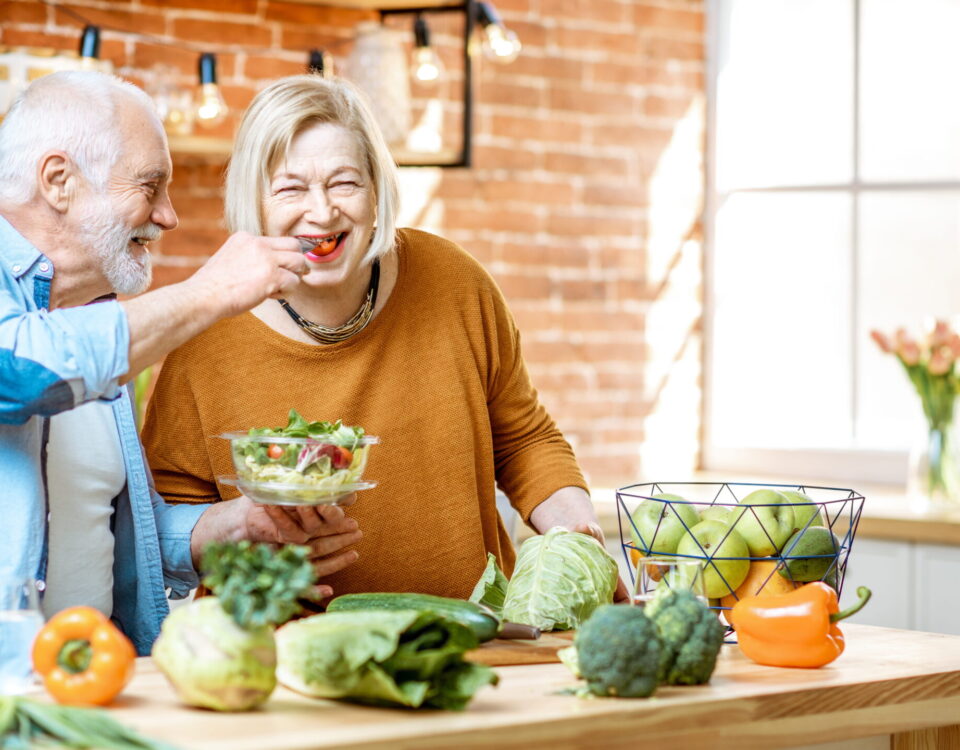
Gut Motility: The Hidden Root of Bloating, Reflux & Constipation
07/22/2025
The Candida Cleanse Diet: How to Spot Overgrowth & Restore Balance
08/20/2025“Why Do I Feel Full So Fast?” What Women 50+ Need to Know About Aging and Digestion

If you’ve ever pushed your plate away halfway through a meal thinking, “I’m already full?” or battled bloating after a healthy dinner, you’re not alone. Many women in midlife find themselves struggling with fullness and discomfort after meals that used to feel perfectly normal.
What gives?
It turns out, your digestive system naturally changes as you age. Even when you’re eating clean and healthy, your body might be asking for something different than it used to. In fact, many women unknowingly ignore these subtle gut shifts for months—sometimes years—before the scale or their symptoms finally get their attention.
Here’s what might be going on, and how to work with your gut instead of fighting it.
Your Digestive System Evolves with Age
Digestion isn’t static. As we age, several physical and functional changes in the gut can lead to increased fullness, bloating, and sluggish digestion—even if you’re eating all the “right” things.
1. Slower Stomach Emptying
Food tends to linger longer in the stomach as we get older, especially after larger meals. This delay can create a feeling of pressure, early fullness, or even reflux.
2. Less Stretchy Stomach
The stomach becomes less elastic with age. That means it doesn’t expand as easily to accommodate high-volume meals—even if they’re made of veggies and lean protein.
3. Fewer Digestive Enzymes & Lower Stomach Acid
Digestive juices (enzymes) naturally decline over time, making it harder to break down protein, fat, and even fiber. Undigested food can ferment and lead to gas or bloating.
4. Sluggish Gut Motility
Your gut’s natural muscle contractions—what keeps food moving through the digestive tract—slow down with age. This can leave you feeling heavy, full, or constipated.
Why “Healthy” Meals Might Feel Too Heavy Now
It’s frustrating when the meals you know are good for you start leaving you uncomfortable. Many women over 50 eat clean but feel worse—not better—after big salads, raw veggies, or fiber-rich bowls.
That’s because it’s not just about what you eat—it’s also about how your body handles it. Healthy foods that are high in volume or tough to break down may overwhelm your digestive system now, even if they didn’t before.
5 Simple Shifts That Make a Big Difference
Here’s how to stay nourished, bloat-free, and in tune with your changing gut:
1. Cook More, Crunch Less
Gently cooked vegetables (like steamed broccoli or sautéed spinach) are easier to break down than raw ones. Warm, soft meals like soups and stir-fries give your gut a break while keeping fiber and nutrients intact.
2. Blend Your Veggies (Smartly)
If you love raw produce, try veggie smoothies with cucumber, parsley, spinach, lemon, and a little ginger. You’ll reduce volume and boost hydration, but skip the ice-cold or seed-heavy blends if they leave you bloated.
3. Slow Down and Chew Well
Thorough chewing signals your gut to start producing enzymes and acid. Plus, eating slowly gives your brain time to register fullness before you overdo it.
4. Add Digestive Enzymes or Bitters
A gentle enzyme supplement or digestive bitters before meals can help boost your body’s natural digestive capacity, especially for meals high in fiber or protein.
5. Watch the Sugar and Wine
Even modest amounts of sugar or alcohol can slow motility and promote gas. Cutting back might ease bloat and help get your gut back on track.
This Isn’t About Restriction—It’s About Respect
If you’re in your 50s or 60s and noticing these shifts, it doesn’t mean you’re doing anything wrong. It just means your body is giving you new instructions. What worked at 35 might not serve you at 60. That’s not a failure—that’s wisdom!
By adapting how you eat, not just what you eat, you can feel energized, satisfied, and symptom-free again. Less belly bloat. More ease. A better relationship with your gut.
Final Thoughts
Digestive changes with age are natural—and they don’t have to derail your health. If you’ve tried these adjustments for a few weeks and still feel overly full, bloated, or uncomfortable after meals, it may be worth checking in with a practitioner. Conditions like low stomach acid, food sensitivities, or even bacterial overgrowth (like SIBO) can mimic age-related digestive changes—but they’re treatable with the right support. To dive deeper into these topics, watch Brenda’s YouTube videos on gut motility and SIBO—they’re packed with practical tips and simple explanations.
Your gut is evolving. Are you listening?
Let your meals nourish you without weighing you down. Your 60s gut can be just as happy as your 30s gut—with a few simple shifts and a whole lot more self-awareness.



